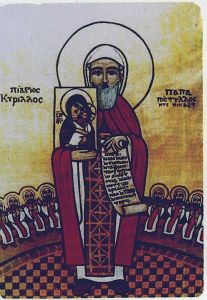 This beginning of miracles did Jesus in Cana of Galilee, and manifested forth His glory, and His disciples believed on Him (John 2:11).
This beginning of miracles did Jesus in Cana of Galilee, and manifested forth His glory, and His disciples believed on Him (John 2:11).
The glory of our Saviour shone forth as the sun’s rays, and more than this, the disciples are confirmed in faith by the miracle.
[…] The Word of God came down then from Heaven, as He Himself says, in order that having as a Bridegroom, made human nature His own, He might persuade it to bring forth the spiritual offspring of Wisdom.
And hence reasonably is the human nature called the bride, the Saviour the Bridegroom; since holy Scripture carries up language from human things to a meaning that is above us.
The marriage is consummated on the third day, that is, in the last times of the present world: for the number three gives us beginning, middle, end.
For thus is the whole of time measured. And in harmony with this do we see that which is said by one of the prophets:
He hath smitten, and He will bind us up. After two days will He revive us, in the third day He will raise us up, and we shall live in His Sight….
For He smote us for the transgression of Adam, saying, Dust thou art, and unto dust shalt thou return.
That which was smitten by corruption and death He bound up on the third day: that is, not in the first, or in the middle, but in the last ages, when for us made Man, He rendered all our nature whole, raising it from the dead in Himself.
Wherefore He is also called the firstfruits of them that slept. Therefore in saying it was the third day, whereon the marriage was being consummated, he signifies the last time.
[…] The Saviour comes to the marriage not of His own accord; for He was being bidden by many voices of the saints.
But wine failed the feasters; for the law perfected nothing, the Mosaic writing sufficed not for perfect enjoyment, but neither did the measure of implanted sobriety reach forth so as to be able to save us.
It was therefore true to say of us too, They have no wine.
But the bounteous God doth not overlook our nature worn out with want of good things. He set forth wine better than the first, for the letter killeth, but the Spirit giveth life.
And the law hath no perfection in good things, but the divine instructions of Gospel teaching bring in fullest blessing.
The ruler of the feast marvels at the wine: for everyone, I suppose, of those ordained to the divine priesthood, and entrusted with the house of our Saviour Christ, is astonished at His doctrine which is above the Law.
Cyril of Alexandria (c. 376-444): Commentary on John, 2, 1.








